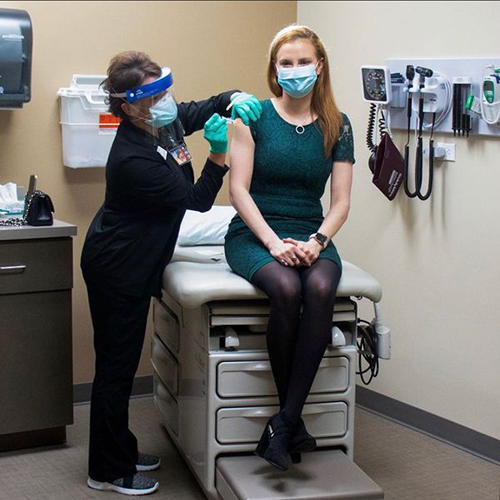Vaccines are widely considered one of the greatest inventions of mankind. The World Health Organization estimates that vaccines prevented over 10 million deaths between 2010 and 2015, and many millions more were protected from illness.
As doses of the COVID-19 vaccine become more available, they bring the promise of global relief from the pandemic. Unfortunately, there has been a lot of misinformation surrounding the vaccine and its development.
Dr. Candace Walkley is an assistant professor with Sam Houston State University College of Osteopathic Medicine and a doctor at the SHSU Physicians Clinic. As an expert in internal medicine, pediatrics and adult infectious diseases, she answers a Q&A on the facts behind common COVID-19 vaccine myths.
—I already had COVID-19, so I do still need the vaccine?
The CDC is recommending that all adults become vaccinated, including those who have had COVID-19 because we do not know how long a patient’s immune system will be active against the virus after true infection—and whether reinfection is possible or after how long a period of time. Patients who have had COVID-19 and received monoclonal antibodies, however, should wait at least 90 days to get vaccinated so that the antibodies they received do not interfere with their own body responding to the vaccination. Also, patients who had natural infection may desire to wait until at least 90 days before they receive vaccine because we know that immunity lasts at least that long. This deferment would allow others who are more at risk to receive the vaccine first.
—If I am not at risk for severe complications due to COVID-19 do I still need get vaccinated?
An important principle of vaccination is that reducing the circulation of an infectious disease results in fewer vulnerable people becoming infected. The initial studies on mRNA vaccines were not designed to assess transmission, but they showed that vaccination reduced symptomatic infection and complications. Longer studies are currently on-going to definitively show that transmission rate reduces after vaccination, but we feel pretty confident that it does based on some preliminary information. We need a majority of people in the community to have immunity in order to reduce the likelihood that a susceptible person comes in contact with a sick person.
—Does the COVID-19 vaccine alter your DNA?
No. There are currently two types of vaccinations that have received Emergency Use Authorization (EUA) from the US federal government, and these are the messenger RNA (mRNA) vaccines (manufactured by Moderna and Pfizer) and the adenovirus vector vaccine (manufactured by Janssen/Johnson and Johnson). Both of these vaccines use new methods to deliver tiny pieces of viral genes to our cells. mRNA vaccines have specific SARS-CoV-2 genes encoded by lipids that are recognized by our body, fuse with our cell membranes, and insert the genetic material into our cells’ cytoplasm. The adenovirus vector is an inactivated form of a common cold virus that contains specific SARS-CoV-2 genes, which can fuse with our cell membranes and insert the SARS-CoV-2 genetic material into our cells’ cytoplasm. Once inside the cytoplasm of our cells, our cells translate the virus’s genetic material into a protein, which they express on their cell surface. These proteins then stimulate immune system cells against SARS-CoV-2. The genetic material in our cytoplasm is immediately degraded by the cell after the protein is created, so no viral genes get anywhere near our cellular nuclei. There is absolutely no change in our human DNA from these vaccines.
—Does the COVID-19 cause infertility?
There is no data to support this claim. Early on, there was concern that the proteins, created and expressed on the cell surfaces to stimulate immune cells, looked similar to proteins that are created by a human placenta during pregnancy. Concern was that the vaccine would stimulate an immune response against the human placenta. But this has not occurred in any human trials. The concern always has been theoretical and was raised by a German doctor who petitioned a European regulatory agency to delay the approval of the Pfizer vaccine. There was never any data to support this concern.
—Were there enough participants in the clinical trials to declare the vaccines safe?
The initial studies used to receive EUA for mRNA vaccines were powered to determine safety and reactogenicity of different vaccine doses with follow up visits on days 1, 2, and at 4 weeks post-each vaccination, as well as 3, 6, and 12 months post second vaccination day. So, those people who participated in the initial studies will be followed all the way out to a year, with reports released about their responses. The Janssen study participants will be followed through 104 weeks (2 years).
—Once I receive the COVID-19 vaccine, why must I continue to wear a mask and practice social distancing?
Until we get firm data that says that vaccination actually interrupts transmission, the CDC is requesting that vaccinated individuals continue to wear a mask around other people who have not been vaccinated. They have released interval recommendations (as of 3/8/2021) that fully vaccinated people (with 2 weeks elapsing since their 2nd mRNA vaccine) can be together without masks and distancing. These recommendations will continue to change as more people are vaccinated.
—Now that we have vaccines, will the pandemic be over soon?
I very much hope so. We may see some of the mutant strains (called “variants”) emerge to cause significant illness, so we are carefully observing. But, currently, the vaccinations seem to provide adequate protection against the most common variants.
—Once fully vaccinated, how long does it take to be effective in protection?
Two weeks after the 2nd Pfizer/Moderna vaccines and two weeks after the Janssen single vaccine.





